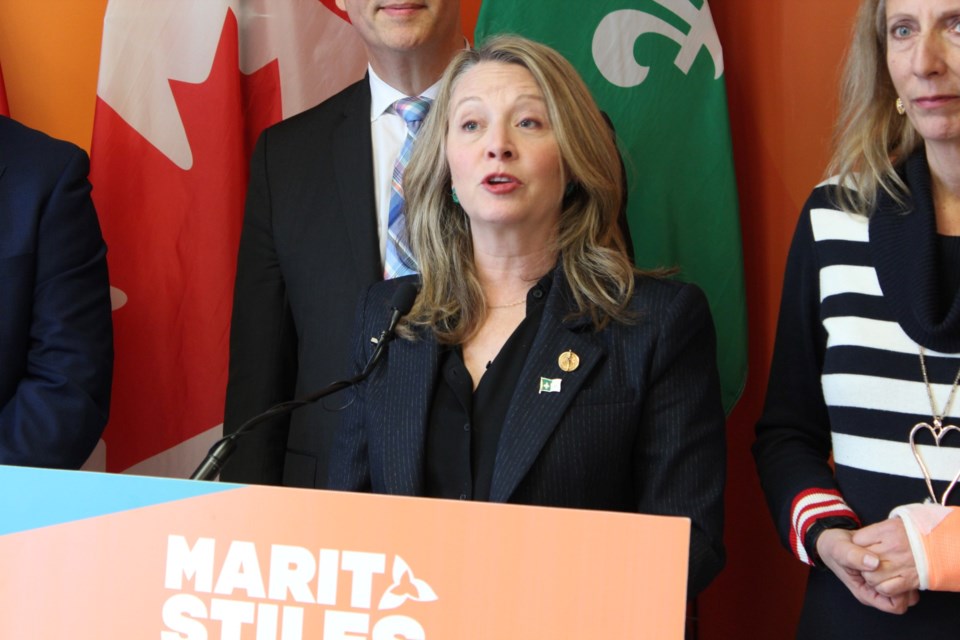Voicing her concern about the uncertainty in the post-secondary sector following a federal announcement to stem the rapid growth of international students coming to Canada, the Ontario NDP leader said underfunding of colleges and universities is to blame.
“I'm really concerned about the uncertainty that has been created for students both here domestically, and our international students as well,” Marit Stiles said, speaking to reporters during a Feb. 1 press conference in Sudbury.
“It’s hard to predict right now how far-reaching the impact of this decision will be. But we do know a couple of things. One is that the (provincial) Conservative government, and the Liberal government before them, underfunded post-secondary education in this province and that they have also failed over and over again to crack down on the bad actors.”
Stiles’ reference to “bad actors” speaks to the term used by several politicians to describe private colleges that have been offering programming to international students in Ontario on behalf of public colleges.
Federal Immigration Minister Marc Miller has called some of these private institutions "the diploma equivalent of puppy mills,” while Ontario Minister of Colleges and Universities Jill Dunlop said some “bad actors” are taking advantage of these students.
Canadore College has a cap of 6,000 students studying through the four Stanford campuses in Mississauga, Toronto, Scarborough and Brampton.
However, George Burton, Canadore's president sent out a statement questioning the government's decision.
"We all agree, that institutions that are exploiting students should cease to operate. However, this blunt instrument will penalize those institutions that have responsibly managed their international enrolments, maintained academic quality, and successfully delivered the Canadian post-secondary education experience to international students," said Burton.
In January, the federal government announced it is making several changes to stem the explosive growth of international students being brought into Canada by post-secondary institutions, which has caused issues that include pressure on housing.
The federal government said it will set an intake cap on international student permit applications to stabilize new growth for a period of two years.
For 2024, the cap is expected to result in approximately 360,000 approved study permits, a decrease of 35 per cent from 2023.
Individual provincial and territorial caps have been established, weighted by population, meaning Ontario’s study permits will actually go down by about 50 per cent.
There are also several other measures in last month’s announcement surrounding the issuing of work permits for international students and their spouses.
Starting in September, international students who begin a study program that is part of a curriculum licensing arrangement will no longer be eligible for a post-graduation work permit upon graduation.
Open work permits will also soon only be available to spouses of international students in master’s and doctoral programs. The spouses of international students in other levels of study, including undergraduate and college programs, will no longer be eligible.
Stiles said “deep cuts” by both the current Progressive Conservative and the previous Liberal governments have left colleges and universities “starved for resources.”
“Many of those institutions have turned to international students to help fill the gap that the provincial government has left there,” she said.
Post-secondary schools are “at a tipping point, and we’ve seen that here,” said Stiles, presumably referring to Laurentian University’s 2021-22 insolvency restructuring.
“But that's happening all across the province of Ontario. The solution is that the Conservative government needs to actually step up and increase per-student funding. We are so far behind every other province in this country.”
She said she does not agree with the conclusions of the blue-ribbon panel on post-secondary education, a report tabled to the provincial government in November which recommended tuition fee increases.
In 2019, the province decided to reduce domestic tuition rates by 10 per cent, after which tuition rates were frozen, with the freeze still in effect.
The government has been tight-lipped about which recommendations it’ll move on since the report came out.
At the time, Colleges and Universities Minister Jill Dunlop said she was “carefully reviewing” the recommendations.
Last week, Premier Doug Ford said he was not in favour of a tuition increase, but his staff clarified soon afterwards that his government is still exploring it as a way to help the sector.
When the federal government announced it would cap international student visas to help cool rental market demand, the province said it would wait until the end of February to figure out if and how it would help the sector.
The end of February is when the province would have to set tuition rates for them to apply for the next school year. Any changes past that wouldn’t apply till 2025.
Stiles said the Ontario NDP disagrees with tuition fee increases because people are already struggling.
“But it is also not acceptable to have the provincial government — Doug Ford and the Conservatives — say nothing,” she said. “He responded yesterday by providing no solutions. He said he’s not hiking tuition. Great. But where’s the funding?”
Raising the spectre of what happened locally at Laurentian, Sudbury MPP Jamie West added during the Feb. 1 press conference that “we need to fund these post-secondary institutions adequately so they can do their jobs that they’re supposed to do.”
Describing them as “diploma mills” and “fly-by-night kind of downtown public-private partnerships in strip malls,” West said the reason partnerships between private and public colleges popped up is because they provided a way for post-secondary institutions to make ends meet.
“The reason the Conservative government and the Liberal party don’t want to talk about funding the schools is because they made this mess, and they don't want to take accountability for it,” said the MPP.
“They’re going to keep talking about tuition to distract from the fact that this is the mess that they developed on their own.”
-With files from The Trillium’s Sneh Duggal and Aidan Chamandy
Heidi Ulrichsen is an assistant editor for Village Media's Sudbury.com. She also covers education and the arts scene.



